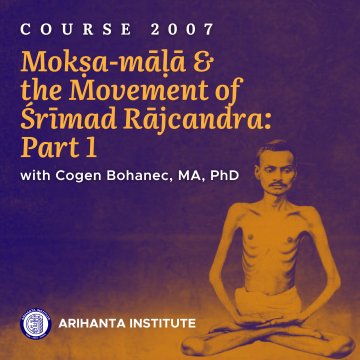Mokṣa-māḷā & the Movement of Śrīmad Rājcandra: Part 1
Course Intro Video


Mokṣa-māḷā & the Movement of Śrīmad Rājcandra: Part 1
Course 2007
Śrīmad Rājcandra (1867-1901) was an important Jain Saint of the late 19th and early 20th centuries who founded a distinct and modern, yet also in many ways quite orthodox, movement of Jainism. While Śrīmad and his followers followed many mainstream Jain teachings and practices, his teachings and the tradition that grew from them are distinct with regards to their emphasis on nonsectarianism, the ability to attain self-realization as a profound experience of one’s spiritual essence in this life or shortly thereafter, understanding of liberation as an attainable goal within 15 lifetimes, a critique of contemporary institutions of mendicancy, and the uniqueness of a bourgeoning lay movement where lay practitioners are the primary source of spiritual authority—a feature that has been widely appealing to Jain lay practitioners. The first half of this two-part course will examine how the events of Śrīmad’s life gave shape to this movement and will look at the philosophical underpinnings of Śrīmad’s tradition based on the Mokṣa-māḷā, a Gujarati text that he composed in 1887, at the age of 20, the same year that he was married, and several years before he attained self-realization and renounced worldly life. In the first half of this course, we will focus primarily on how Śrīmad’s philosophy was informed by notable events in his life, and how in turn these events and this philosophy have influenced the development of the Raj Bhakta Marg, the tradition that has developed from this important modern Jain guru.
Learning Objectives:
- Learn the basic biographical outline of the life of Śrīmad Rajcandra.
- Understand the social and biographical events that led to the development of the Raj Bhakta Marga.
- Examine key features of the Raj Bhakta Marga that make it a unique modern Jain movement.
Course Length
10 HoursCourse Details
• 10-hour self-study course. NOTE: This course is Part 1 of a 2-part course series as combined with course 2008 | Mokṣa-māḷā & the Movement of Śrīmad Rājcandra: Part 2.• Additional readings offered as support material.
• Professor available by appointment.
Learning Area
 Jain Philosophy, History & Anthropology
Jain Philosophy, History & Anthropology Instructor
 Cogen Bohanec, MA, PhD
Cogen Bohanec, MA, PhD
Cogen Bohanec currently holds the position of Assistant Professor in Sanskrit and Jain Studies at Arihanta Institute where he teaches various courses on Jain philosophy and its applications. In addition, he is an Adjunct Assistant Professor at Claremont School of Theology (CST) where he teaches Sanskrit and Gujarati, and he has taught numerous classes on South Asian Culture & Religions and Sanskrit language at the Graduate Theological Union (GTU) in Berkeley. Dr. Bohanec specializes in the Jain and Hindu traditions, comparative dharma traditions, philosophy of religion, theo-ethics (virtue ethics, and environmental and animal ethics in particular), and Sanskrit language and literature, and has numerous publications in those areas, particularly in the fields of Jain and Hindu Studies amongst other disciplines. He has a PhD in “Historical and Cultural Studies of Religion” with an emphasis in Hindu Studies from GTU, where his research emphasized ancient Indian languages, literature, and philosophical systems. He also holds an MA in Buddhist Studies from the Institute of Buddhist Studies at GTU where his research primarily involved translations of Pāli Buddhist scriptures in conversation with the philology of the Hindu Upaniṣads. He is the author of “Bhakti Ethics, Emotions and Love in Gauḍīya Vaiṣṇava Metaethics” (Lexington, 2024), an interdisciplinary study that frames traditional Hindu themes of ecotheology, ecofeminist theology, feminist care ethics, within a framework of virtue ethics in conversation with a bhakti-based psychology of emotions. Currently he is largely engaged in publication and research on various aspects of the Jain tradition, emphasizing translations and analyses of Jain Sanskrit, Prakrit, and Gujarati texts, but is also publishing academic works on various topics within the Hindu tradition.
Enrollment Options
14-DAY FREE TRIAL
- Free, unlimited access to our self-paced courses for 14-days.
- Already used your free trial? Enroll in our Monthly or Annual Membership options at anytime and continue learning immediately!
MONTHLY MEMBERSHIP
- $45 USD / Month
-
Immediate access to course
#### | Name. - Unlimited access to our live and self-paced courses for one month, with month-to-month auto rollover.
- Excludes graduate seminars, language courses, and courses hosted on partner platforms.

